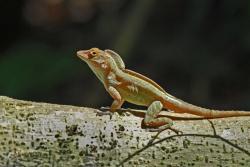Nov 27 2012
One tropical lizard's tolerance to cold is stiffer than scientists had suspected.
 The Puerto Rican lizard Anolis cristatellus pictured above has adapted to the cooler winters of Miami. Credit: Manuel Leal, Duke
The Puerto Rican lizard Anolis cristatellus pictured above has adapted to the cooler winters of Miami. Credit: Manuel Leal, Duke
A new study shows that the Puerto Rican lizard Anolis cristatellus has adapted to the cooler winters of Miami. The results also suggest that this lizard may be able to tolerate temperature variations caused by climate change.
"We are not saying that climate change is not a problem for lizards. It is a major problem. However, these findings indicate that the thermal physiology of tropical lizards is more easily altered than previously proposed," said Duke biologist Manuel Leal, co-author of the study, which appears in the Dec. 6 issue of The American Naturalist.
Scientists previously proposed that because lizards were cold-blooded, they wouldn't be able to tolerate or adapt to cooler temperatures.
Humans, however, introduced Puerto Rican native A. cristatellus to Miami around 1975. In Miami, the average temperature is about 10 degrees Celsius cooler in winter than in Puerto Rico. The average summer temperatures are similar.
Leal and his graduate student Alex Gunderson captured A. cristatellus from Miami's Pinecrest area and also from northeastern Puerto Rico. They brought the animals back to their North Carolina lab, slid a thermometer in each lizard's cloaca and chilled the air to a series of cooler temperatures. The scientists then watched how easy it was for the lizards to right themselves after they had been flipped on their backs.
The lizards from Miami flipped themselves over in temperatures that were 3 degrees Celsius cooler than the lizards from Puerto Rico. Animals that flip over at lower temperatures have higher tolerances for cold temperatures, which is likely advantageous when air temperatures drop, Leal said.
"It is very easy for the lizards to flip themselves over when they are not cold or not over-heating. It becomes harder for them to flip over as they get colder, down to the point at which they are unable to do so," he said.
At that point, called the critical temperature minimum, the lizards aren't dead. They've just lost control of their coordination. "It is like a human that is suffering from hypothermia and is beginning to lose his or her balance or is not capable of walking. It is basically the same problem. The body temperature is too cold for muscles to work properly," he said.
Leal explained that a difference of 3 degrees Celsius is "relatively large and when we take into account that it has occurred in approximately 35 generations, it is even more impressive." Most evolutionary change happens on the time scale of a few hundred, thousands or millions of years. Thirty-five years is a time scale that happens during a human lifetime, so we can witness this evolutionary change, he said.
The lizards' cold tolerance also "provides a glimpse of hope for some tropical species," Leal added, cautioning that at present scientists don't know how quickly tolerance to high temperatures -- another important consequence of climate change -- can evolve.
He and Gunderson are now working on the heat-tolerance experiments, along with tests to study whether other lizard species can adjust to colder temperatures.